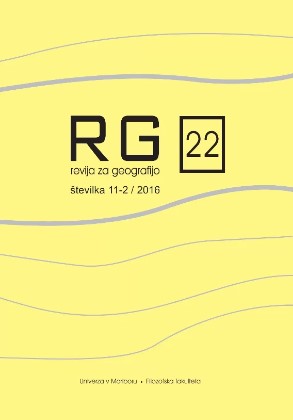Evaluation of the project Pilsen – European capital of culture 2015
DOI:
https://doi.org/10.18690/rg.11.2.3980Keywords:
European Capital of Culture, Pilsen, evaluation researchAbstract
The paper deals with the evaluation of the project Pilsen – European Capital of Culture 2015. It is based on a few empiric research studies that were implemented after the project was finished. It presents the city of Pilsen and the project of the European Capital of Culture form its initiation to implementation. It deals with the benefits of the project from the point of view of attendance, investment, tourism, and impacts on the economic development. It also brings the evaluation of the project Pilsen - European Capital of Culture 2015 as seen by the city´s residents.
Downloads
References
Bartoš, F. 2016: Turismus v Plzni. Závěrečná zpráva ze čtyř vln šetření návštěvníků města. Praha: ppm factum reasearch s.r.o.
Campbell, P. 2011: Creative industries in a European Capital of Culture. International Journal of Cultural Policy. (17) 5, s. 510–522. https://doi.org/10.1080/10286632.2010.543461
Ecotec, 2009: Ex-post evaluation of 2007 & 2008 European Capitals of Culture. [online] Birmingham: ECOTEC Research and Consulting Ltd. <http://ec.europa.eu/programmes/creative-europe/actions/documents/ecoc/expost-2007-08_en.pdf>
Evans, G. 2005: Measure for measure: evaluating the evidence of culture's contribution to regeneration. Urban Studies. 42 (5/6): 959–984.
Fišer, S. et al. 2013. Maribor 2012 – The European Capital of Culture. From challenges to results. Maribor: Florjančič tisk, d.o.o.
Fox, T., Rampton, J. 2015: Ex-Post evaluation of the European Capitals of Culture. Final Report. [online]. European Union. <http://ec.europa.eu/programmes/creative-europe/actions/documents/ecoc-2014-report_en.pdf>
Hudec, O., Džupka, P., Šebová, M., Gontkovičová, B. 2015: Košice – Európske hlavné mesto kultúry 2013. Vplyv veľkého kultúrneho projektu na miestnu ekonomiku a imidž mesta. Košice: Ekonomická fakulta, TU Košice.
Impacts 2008: The Economic Impact of Visits Influenced by the Liverpool European Capital of Culture in 2008. <http://www.liv.ac.uk/impacts08/Publications/publications.htm>
Impacts 2008: European Capital of Culture Research Programme, http://www.liv.ac.uk/impacts08/
Ježek, J., Šlehoferová, M., Ircingová, J., Janeček, P. 2016a: Výzkum ekonomických efektů projektu Plzeň – Evropské hlavní město kultury 2015. Západočeská univerzita v Plzni, Středisko pro výzkum regionálního rozvoje.
Ježek, J., Šlehoferová, M., Ircingová, J., Janeček, P. 2016b: Výzkum informovanosti, postojů a participace obyvatel města Plzně na projektu „Plzeň – Evropské hlavní město kultury 2015“. Plzeň: Západočeská univerzita v Plzni, Středisko pro výzkum regionálního rozvoje.
Ježek, J., Vacek, J., Ircingová, J., Kaňka, L. 2015: Návrh systému sledování a hodnocení projektu Plzeň – Evropské hlavní město kultury 2015. Plzeň: Západočeská univerzita v Plzni, Středisko pro výzkum regionálního rozvoje.
Kunzmann, K. R. 2002: Kultur, Wirtschaft und Raumentwicklung. Informationen zur Raumentwicklung. 4 (4/5): 185-197.
Lähdesmäki, T. 2014: European Capital of Culture Designationas an Initiator of Urban Transformation in the Post-socialist Countries. European Planning Studies. 22 (3): 481–497. https://doi.org/10.1080/09654313.2012.752438
Liu, Y. D. 2014: Cultural Events and Cultural Tourism Development: Lessons from the European Capitals of Culture. European Planning Studies. 22 (3): 498–514. https://doi.org/10.1080/09654313.2012.752442
McAtter, N., Mozuraityte, N., McDonald, N. 2013: Ex-Post Evaluation of 2012 European Capitals of Culture [online]. Ecorys UK Ltd. <http://ec.europa.eu/programmes/creative-europe/actions/documents/ecoc/2012/first-evaluation_en.pdf>
McAtter, N., Rampton, J., France, J., Tajtáková, M., Lehouelleur, S. 2014. Ex-Post Evaluation of 2013 European Capitals of Culture [online]. Ecorys UK Ltd. < http://ec.europa.eu/programmes/creative-europe/actions/documents/ecoc-2013-full-report.pdf>
McCoshan, A., Rampton, J., Mozuraityte, N., McAtter, N. 2010: Ex-Post Evaluation of 2009 European Capitals of Culture [online]. ECOTEC Research and Consulting Ltd. <http://ec.europa.eu/culture/tools/actions/documents/ecoc/ecoc-evaluation-2009_en.pdf>
Nosková, M. 2016: Regional Economic Effects of the European Capital of Culture Project: the use of Input-Output Analysis. E + M (Economics and Management), (19 (3): 57-74.
Palmer, R. et al. 2004 and 2007: European Cities and Capitals of Culture: Part I. and II. Study Prepared for the European Commission. Palmer-Rae Associates: Brussels.
Raabová, T. 2010: Multiplikační efekty kulturních odvětví v České republice. Studie stavu, struktury, podmínek a financování umění v ČR. Praha: Institut umění – Divadelní ústav.
Raabová, T. et al. 2016: Evropské hlavní město kultury Plzeň 2015: Dopady výdajů návštěvníků na ekonomiku ČR. Economic impacT v.o.s.
Rampton, J., McAtter, N., Mozuraityte, N., Levai, M., Akcali, S. 2011: Ex-Post Evaluation of 2010 European Capitals of Culture [online]. Ecorys UK Ltd. <http://ec.europa.eu/programmes/creative-europe/actions/documents/ecoc/ecoc-2010-report_en.pdf>
Rampton, J., Mozuraityte, N., Anderson, H., Reincke, E. 2012: Ex-Post Evaluation of 2011 European Capitals of Culture [online]. Ecorys UK Ltd. <http://ec.europa.eu/culture/tools/actions/documents/ecoc/2011/evaluation_en.pdf>
Downloads
Published
Issue
Section
License
Copyright (c) 2016 Jiří Ježek

This work is licensed under a Creative Commons Attribution 4.0 International License.
